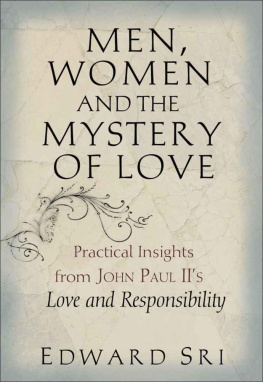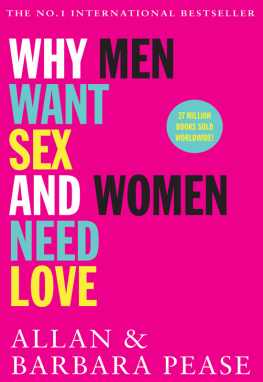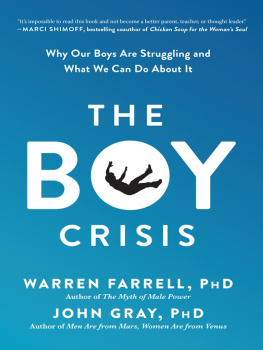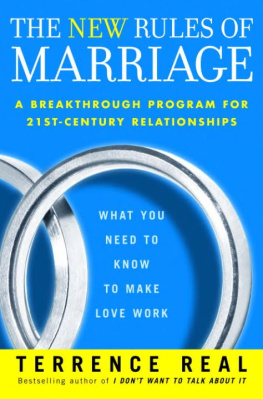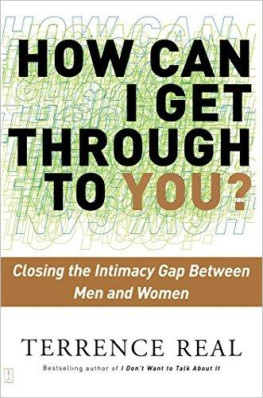How Can I Get Through to You?
Reconnecting Men and Womeng
Terrence Real
SCRIBNER
New York London Toronto Sydney Singapore
SCRIBNER
1230 Avenue of the Americas
New York, NY 10020
www.SimonandSchuster.com
Copyright 2002 by Terrence Real
All rights reserved, including the right of reproduction in whole or in part in any form.
SCRIBNER and design are trademarks of Macmillan Library Reference USA, Inc., used under license by Simon & Schuster, the publisher of this work.
For information about special discounts for bulk purchases, please contact Simon & Schuster Special Sales: 1-800-465-6798 or business@simonandschuster.com
DESIGNED BY ERICH HOBBING
Text set in Janson
Manufactured in the United States of America
10 9 8 7 6 5 4 3 2 1
Library of Congress Cataloging-in-Publication Data is available.
ISBN-10: 0-684-86877-6
eISBN-13: 978-1-439-10676-1
ISBN-13: 978-0-684-86877-6
To Belinda, the jewel in the petal, the object of my desire.
What have we given? My friend, blood shaking my heart The awful daring of a moments surrender Which an age of prudence can never retract By this, and only this, we have existed.
T. S. ELIOT
We ourselves cannot put any magic spells on this world. The world is its own magic.
SHUNRYU SUZUKI-ROSHI
ACKNOWLEDGMENTS
I did not write this book alone, but with guidance and sustenance from many. First among them is Carol Gilligan. Over the past several years, our collaboration with couples transformed my vision of what men and women are capable of. Many of the critical ideas found here have been shaped by that association, and every idea has been touched by it. You are my fellow cartographer. But more than this, it is the lessons of our friendship that have lent me the most clarity and courage. Thank you for standing together with me.
Cheryl Richardson is my spiritual sister. Her insight, practicality, and sheer wattage have been abundant enough to empower both of us. Her positive energy ripples through these pages. Thank you for teaching me so much about generosity. Beth Vesel, my literary agent, has been intellectual companion, bellwether, and friend. At Scribner, Gillian Blake left her imprint on every aspect of this work. With unerring editorial instincts, she saw, and helped realize, a vision. I want to thank Pat Eisemann for her encouragement and savvy. And gratitude goes to the presiding spirit of Nan Graham, whose belief in me, and whose guidance, has been invaluable. You are the occasion I have tried to rise to. My association with Pia Mellody, teacher, healer, dear friend, continues to enrich. This work rests upon hers. I want also to thank the Meadows, in particular Pat Mellody and Lonnie Werdersky, for their support. Thanks go to the legendary Olga Silverstein, who sits beside me each time I see a couple or family, to Mel Bucholtz for helping bring me into right relationship to this work, and to Ed Shea for his unstinting help. I am grateful to my assistant, Liz Grabiner, for assistance throughout the project, especially with the notes. I want to thank friends, old and new, for their love and patience. And finally, thanks to my family, to Justin and Alexander, who daily inspire, and to my wife, Belinda, who claims to have been put on this earth to, among other things, help me with my narcissism, a difficult task by any account. I hope to keep making it worth your while.
CONTENTS
AUTHORS NOTE
All of the cases described in this book are composites. They have been deliberately scrambled in order to protect my clients rights of confidentiality and privacy. No client found in this book corresponds to any actual person, living or dead.
How Can I Get Through to You?
INTRODUCTION
The relationship between men and women is in trouble, and it has been for over a generation. of community is breaking down, our sense of belonging has seldom felt weaker, and, silhouetted against this backdrop, couples that once loved one another have never had a more difficult time holding fast.
For over forty years the enormously influential womens movement has examined the oppression of girls and women in our society, the corrosive force leveled against our daughters to make them conformand the psychological cost of girls compliance. We have just begun to extend similar empathy and support to our sons. And even now, as I write, it seems easier for us as a culture to empathize with boys than with grown men. But if we are to heal the enmity between the sexescollectively as a culture or individually in our own marriageswe must begin to understand the forces that shape, and misshape, our husbands. The idea of opening our hearts to men will strike some women as opening the door to disempowerment. Being soft on men means to many a facile excuse for difficult, even dangerous behavior. There has been a split in our cultural attitude toward men. For a generation, feminists have held men responsible for privileged, insensitive, and at times offensive behaviors. But most feminists have not spoken to mens subjective experience of pain. Psychologists and those in the mens movement, by contrast, have begun to look at the cultural gauntlet through which our sons must pass, and the damage it does to them. But, in all their empathy, they rarely acknowledge the power men wield. One camp speaks of the violence men do, the other of the violence done to them. If men and women are to learn how to preserve the natural state of love and respect each deserves, both aspects of masculinity must be addressedthe wounding and the wound.
publication of my previous book, I Dont Want to Talk About It: Overcoming the Secret Legacy of Male Depression, I have spent a fair amount of time on the road, speaking and giving workshops throughout the country to both health professionals and to the general public about men and what ails them. Wherever I have gone, I have been struck by a burgeoning desire, almost a sense of urgency, about figuring men outhow we can help struggling sons, husbands, fathers, in much the same way that women collectively began helping daughters, wives, and mothers a generation ago.
research on boys and their development tells us that, despite our raised consciousness and good intentions, boys today, no less than ever before, are permeated with an inescapable set of highly constricting rules. Those boys who try to step out of the box place themselves in harms way since, even today, our cultures tolerance for young men who deviate from what we deem masculine is limited, and our intolerance expresses itself in singularly ugly ways. The great bind is that those boys who do not resist, who choose or who are coerced to comply, do not escape either. Avoiding attack from without, those who adopt the traditions of male stoicism and self-reliance risk injury to the deepest and most alive aspects of their own being. The consequence of opposition is psychological and often physical brutality. The consequence of compliance is emotional truncation, numbness, and isolation.
Good-bye, Justin, I say as I drop my thirteen-year-old off at school in the morning. Unlike his ten-year-old brother, Alexander, Justin averts his face from my farewell kiss, concerned that we will be observed. Though Justin is ebullient and vivacious at home, his expression visibly hardens as the low-slung school buildings come into view; his voice drops to a near monotone. I watch my son dampen down, toughen up. I watch him try to fit in. Despite his best efforts to hide his openness, older boys, bullies, have picked up the scent of emotional vulnerability in him, like a pheromone, and episodically over the years they have tortured him for it. The school protects Justin, and his mother and I arm him, as best we can. But in the mean game of inclusion/exclusion, ridicule and praise, in the socialization fields of the playground, Justin knows better than anyone that it is he alone who must make his way. Who am I to tell my son that he should keep his heart open as he threads his path to the classroom? And who am I to tell him that he should not? I dont begrudge Justin the emotional armor he dons each morning, the mask of feeling less, caring less, than he really does. It just makes me sad.



